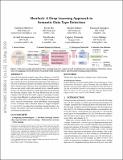Sherlock: A Deep Learning Approach to Semantic Data Type Detection
Author(s)
Hulsebos, Madelon; Hu, Kevin; Bakker, Michiel A; Zgraggen, Emanuel; Satyanarayan, Arvind; Kraska, Tim; Demiralp, Cagatay; Hidalgo, Cesar Augusto; ... Show more Show less
DownloadSubmitted version (2.214Mb)
Open Access Policy
Open Access Policy
Creative Commons Attribution-Noncommercial-Share Alike
Terms of use
Metadata
Show full item recordAbstract
© 2019 Copyright held by the owner/author(s). Publication rights licensed to ACM. Correctly detecting the semantic type of data columns is crucial for data science tasks such as automated data cleaning, schema matching, and data discovery. Existing data preparation and analysis systems rely on dictionary lookups and regular expression matching to detect semantic types. However, these matching-based approaches often are not robust to dirty data and only detect a limited number of types. We introduce Sherlock, a multi-input deep neural network for detecting semantic types. We train Sherlock on 686, 765 data columns retrieved from the VizNet corpus by matching 78 semantic types from DBpedia to column headers. We characterize each matched column with 1, 588 features describing the statistical properties, character distributions, word embeddings, and paragraph vectors of column values. Sherlock achieves a support-weighted F1 score of 0.89, exceeding that of machine learning baselines, dictionary and regular expression benchmarks, and the consensus of crowdsourced annotations.
Date issued
2019Department
Massachusetts Institute of Technology. Computer Science and Artificial Intelligence Laboratory; Massachusetts Institute of Technology. Media Laboratory; Massachusetts Institute of Technology. Department of Electrical Engineering and Computer ScienceJournal
Proceedings of the ACM SIGKDD International Conference on Knowledge Discovery and Data Mining
Publisher
Association for Computing Machinery (ACM)